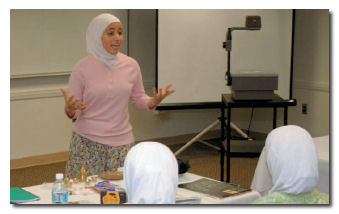Teachers from Jordan and Morocco train at ELI
 |
Teacher Zeina Mohamad Abed shares new classroom methods with her compatriots during a five-week teacher training program this summer. |
English teachers and teacher trainers from the Middle East and North Africa participated in five-week summer workshops under two programs funded through the U.S. Department of State Bureau of Education and Cultural Affairs.
Twelve primary and secondary school teachers from Jordan and a dozen teacher trainers and supervisors from Morocco became the first participants from their countries to undergo training in language teaching pedagogy in the United States.
“It’s a great chance for us to be here,” said Muna Abu-Murrah, a ninth grade teacher in Amman, Jordan.
The purpose of the dual-country program is to facilitate efforts in both countries to offer English instruction in earlier grade levels by upgrading the skills of English language teachers.
Program coordinators were Kathy Schneider, Brett Tomashek and Baerbel Schumacher.
“The State Department has given this its highest priority as it seeks to engage the Middle East through positive professional development initiatives,” said Dr. Scott Stevens, project director.
“Both Morocco and Jordan have recently concluded free trade agreements with the United States,” he said. “Our teacher training program was thus a natural outgrowth of the deepening relationships with these countries.
“Developing a stronger English language infrastructure within Morocco and Jordan will be key to promoting international trade and commerce.”
The Jordanian teachers, six men and six women each with less than five years experience teaching English, expressed enthusiasm for the communicative teaching methods which they said they would adapt to their classrooms.
“We need these techniques because our students are afraid of English,” said Bashar Odeh, a doctoral student in education.
“If we use games and songs they will love the subject, and if they love it, they will learn it well.”
Many of the Moroccan participants were also relatively new in their positions as teacher trainers and inspectors, and all were eager to train the teachers they supervise in new methods of teaching English.
“We’ve had a chance to share among ourselves here and have gained confidence in our own training,” said Nezha Belkachla, a teacher trainer in Marrakech, Morocco.
“We’ve learned how to implement [theory] here,” said Khadija Kairit.
“We’ve learned how to motivate students,” said Abderrahim Biare. “That’s what we were lacking.”
Participants were each provided with more than 30 English resource and activity books to take back with them. The materials were part of a major “Books in a Box” initiative to provide hundreds of teachers in each country with resources to supplement class textbooks.
“Supplementary materials are scarce,” said Biare. “We are glad to get them.”
Both groups spent two weeks living with American families, and participants were appreciative of the many contacts, both professional and personal, which they had made.
“When you live with the culture, things become clearer, not just stereotypes,” said Biare, who, unlike most of his colleagues, was no newcomer to the United States.
“I’ve visited many times,” he said, “but for the first time I’ve met so many Americans. This time I feel like I’ve really been here.”